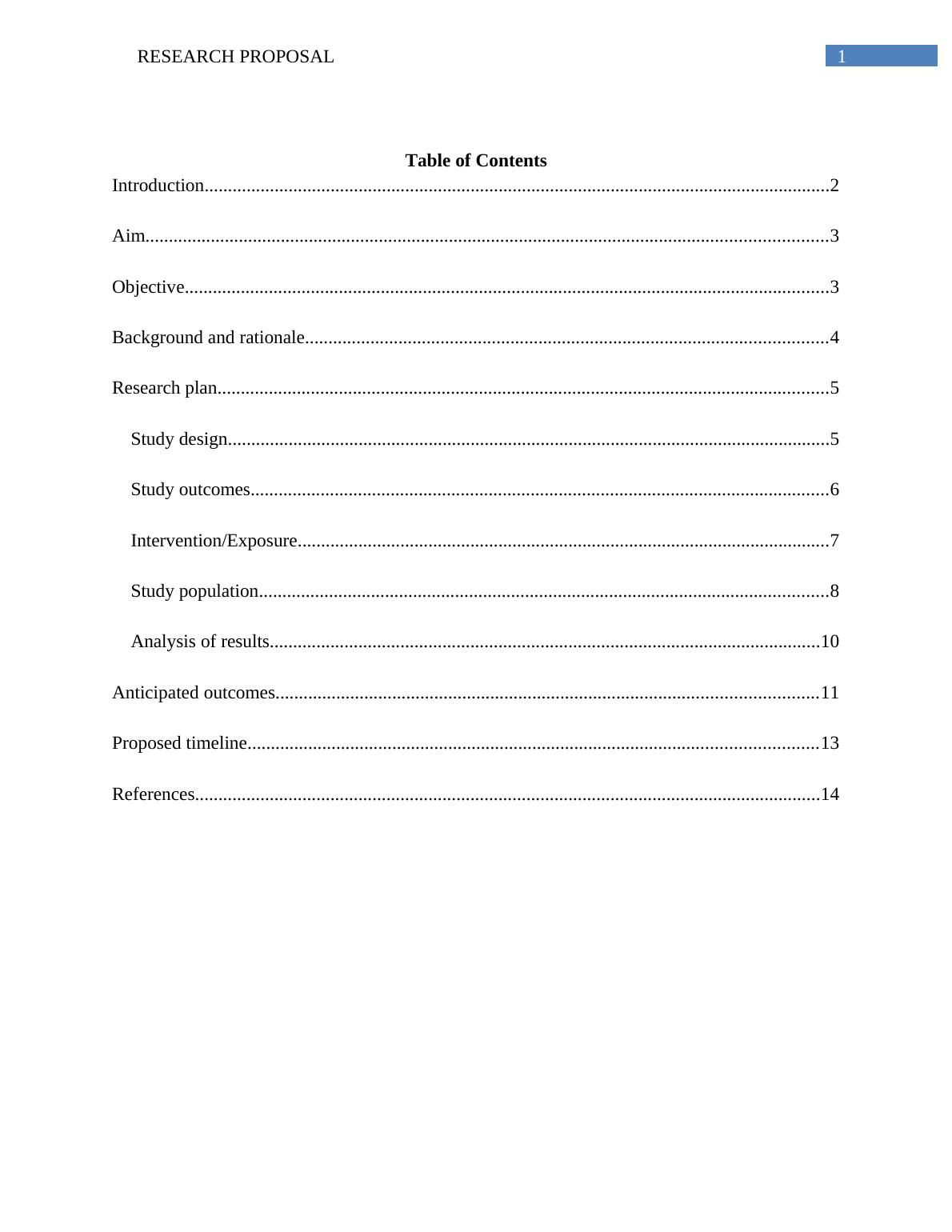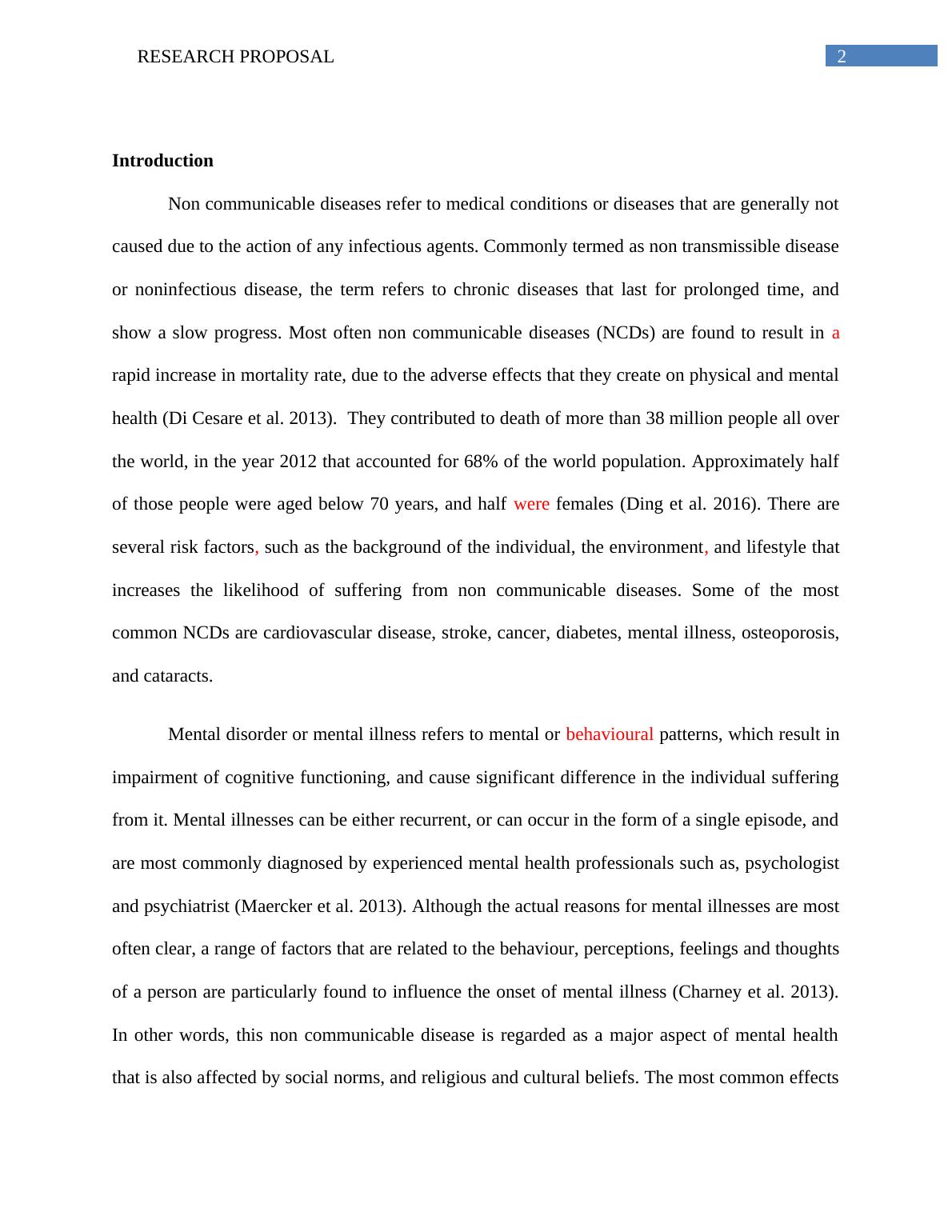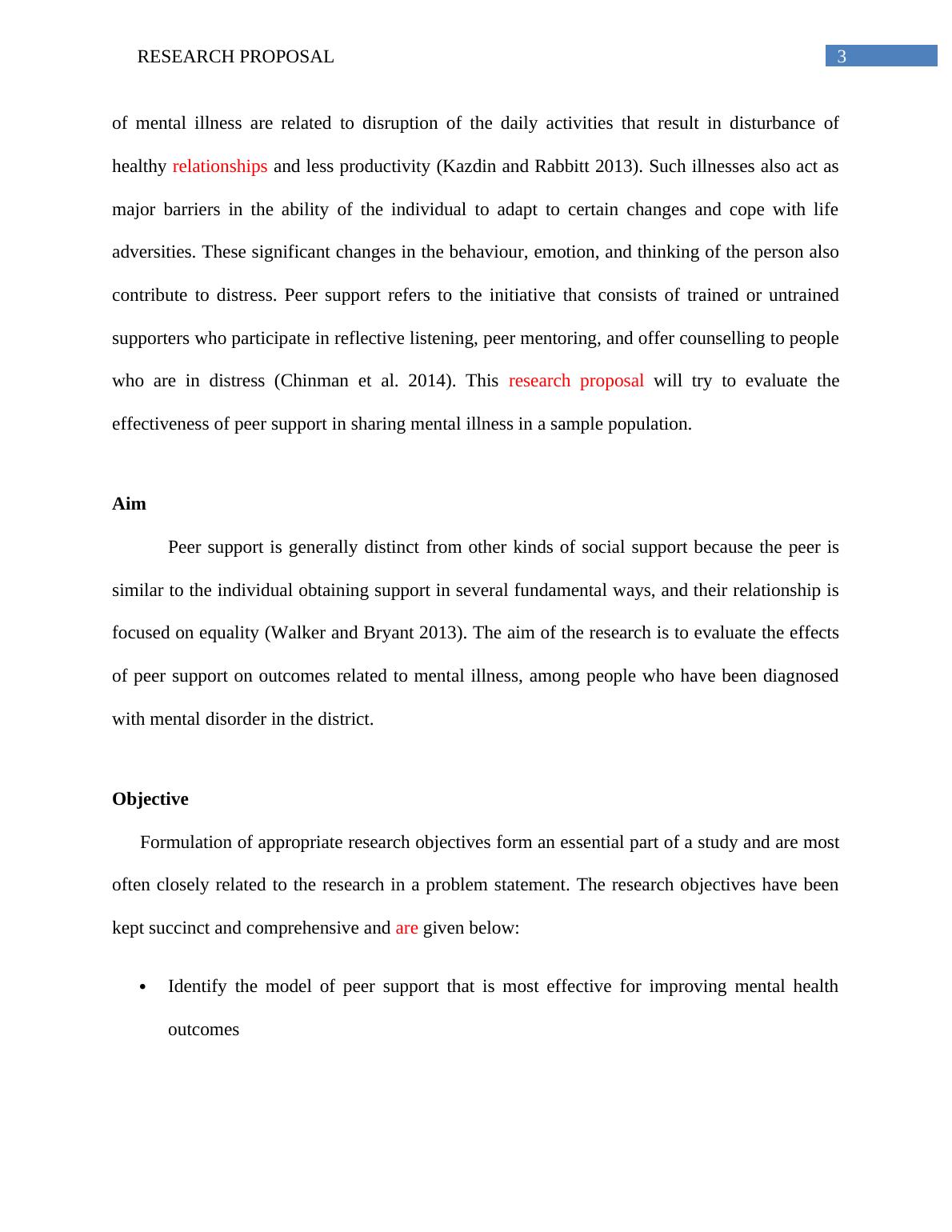Non Communicable Diseases - PDF
Added on 2021-04-17
19 Pages4997 Words37 Views
Running head: RESEARCH PROPOSAL
Assignment 3
Name of the Student
Name of the University
Author Note
Assignment 3
Name of the Student
Name of the University
Author Note

1RESEARCH PROPOSAL
Table of Contents
Introduction......................................................................................................................................2
Aim..................................................................................................................................................3
Objective..........................................................................................................................................3
Background and rationale................................................................................................................4
Research plan...................................................................................................................................5
Study design.................................................................................................................................5
Study outcomes............................................................................................................................6
Intervention/Exposure..................................................................................................................7
Study population..........................................................................................................................8
Analysis of results......................................................................................................................10
Anticipated outcomes....................................................................................................................11
Proposed timeline..........................................................................................................................13
References......................................................................................................................................14
Table of Contents
Introduction......................................................................................................................................2
Aim..................................................................................................................................................3
Objective..........................................................................................................................................3
Background and rationale................................................................................................................4
Research plan...................................................................................................................................5
Study design.................................................................................................................................5
Study outcomes............................................................................................................................6
Intervention/Exposure..................................................................................................................7
Study population..........................................................................................................................8
Analysis of results......................................................................................................................10
Anticipated outcomes....................................................................................................................11
Proposed timeline..........................................................................................................................13
References......................................................................................................................................14

2RESEARCH PROPOSAL
Introduction
Non communicable diseases refer to medical conditions or diseases that are generally not
caused due to the action of any infectious agents. Commonly termed as non transmissible disease
or noninfectious disease, the term refers to chronic diseases that last for prolonged time, and
show a slow progress. Most often non communicable diseases (NCDs) are found to result in a
rapid increase in mortality rate, due to the adverse effects that they create on physical and mental
health (Di Cesare et al. 2013). They contributed to death of more than 38 million people all over
the world, in the year 2012 that accounted for 68% of the world population. Approximately half
of those people were aged below 70 years, and half were females (Ding et al. 2016). There are
several risk factors, such as the background of the individual, the environment, and lifestyle that
increases the likelihood of suffering from non communicable diseases. Some of the most
common NCDs are cardiovascular disease, stroke, cancer, diabetes, mental illness, osteoporosis,
and cataracts.
Mental disorder or mental illness refers to mental or behavioural patterns, which result in
impairment of cognitive functioning, and cause significant difference in the individual suffering
from it. Mental illnesses can be either recurrent, or can occur in the form of a single episode, and
are most commonly diagnosed by experienced mental health professionals such as, psychologist
and psychiatrist (Maercker et al. 2013). Although the actual reasons for mental illnesses are most
often clear, a range of factors that are related to the behaviour, perceptions, feelings and thoughts
of a person are particularly found to influence the onset of mental illness (Charney et al. 2013).
In other words, this non communicable disease is regarded as a major aspect of mental health
that is also affected by social norms, and religious and cultural beliefs. The most common effects
Introduction
Non communicable diseases refer to medical conditions or diseases that are generally not
caused due to the action of any infectious agents. Commonly termed as non transmissible disease
or noninfectious disease, the term refers to chronic diseases that last for prolonged time, and
show a slow progress. Most often non communicable diseases (NCDs) are found to result in a
rapid increase in mortality rate, due to the adverse effects that they create on physical and mental
health (Di Cesare et al. 2013). They contributed to death of more than 38 million people all over
the world, in the year 2012 that accounted for 68% of the world population. Approximately half
of those people were aged below 70 years, and half were females (Ding et al. 2016). There are
several risk factors, such as the background of the individual, the environment, and lifestyle that
increases the likelihood of suffering from non communicable diseases. Some of the most
common NCDs are cardiovascular disease, stroke, cancer, diabetes, mental illness, osteoporosis,
and cataracts.
Mental disorder or mental illness refers to mental or behavioural patterns, which result in
impairment of cognitive functioning, and cause significant difference in the individual suffering
from it. Mental illnesses can be either recurrent, or can occur in the form of a single episode, and
are most commonly diagnosed by experienced mental health professionals such as, psychologist
and psychiatrist (Maercker et al. 2013). Although the actual reasons for mental illnesses are most
often clear, a range of factors that are related to the behaviour, perceptions, feelings and thoughts
of a person are particularly found to influence the onset of mental illness (Charney et al. 2013).
In other words, this non communicable disease is regarded as a major aspect of mental health
that is also affected by social norms, and religious and cultural beliefs. The most common effects

3RESEARCH PROPOSAL
of mental illness are related to disruption of the daily activities that result in disturbance of
healthy relationships and less productivity (Kazdin and Rabbitt 2013). Such illnesses also act as
major barriers in the ability of the individual to adapt to certain changes and cope with life
adversities. These significant changes in the behaviour, emotion, and thinking of the person also
contribute to distress. Peer support refers to the initiative that consists of trained or untrained
supporters who participate in reflective listening, peer mentoring, and offer counselling to people
who are in distress (Chinman et al. 2014). This research proposal will try to evaluate the
effectiveness of peer support in sharing mental illness in a sample population.
Aim
Peer support is generally distinct from other kinds of social support because the peer is
similar to the individual obtaining support in several fundamental ways, and their relationship is
focused on equality (Walker and Bryant 2013). The aim of the research is to evaluate the effects
of peer support on outcomes related to mental illness, among people who have been diagnosed
with mental disorder in the district.
Objective
Formulation of appropriate research objectives form an essential part of a study and are most
often closely related to the research in a problem statement. The research objectives have been
kept succinct and comprehensive and are given below:
Identify the model of peer support that is most effective for improving mental health
outcomes
of mental illness are related to disruption of the daily activities that result in disturbance of
healthy relationships and less productivity (Kazdin and Rabbitt 2013). Such illnesses also act as
major barriers in the ability of the individual to adapt to certain changes and cope with life
adversities. These significant changes in the behaviour, emotion, and thinking of the person also
contribute to distress. Peer support refers to the initiative that consists of trained or untrained
supporters who participate in reflective listening, peer mentoring, and offer counselling to people
who are in distress (Chinman et al. 2014). This research proposal will try to evaluate the
effectiveness of peer support in sharing mental illness in a sample population.
Aim
Peer support is generally distinct from other kinds of social support because the peer is
similar to the individual obtaining support in several fundamental ways, and their relationship is
focused on equality (Walker and Bryant 2013). The aim of the research is to evaluate the effects
of peer support on outcomes related to mental illness, among people who have been diagnosed
with mental disorder in the district.
Objective
Formulation of appropriate research objectives form an essential part of a study and are most
often closely related to the research in a problem statement. The research objectives have been
kept succinct and comprehensive and are given below:
Identify the model of peer support that is most effective for improving mental health
outcomes

End of preview
Want to access all the pages? Upload your documents or become a member.
Related Documents
Global Challenge: Non-Communicable Diseaseslg...
|13
|3919
|53
Chronic Conditions in Australialg...
|10
|2382
|454
Global Policies on Control and Prevention of Non-Communicable Diseaseslg...
|12
|3186
|429
Non-Communicable Disease Burdenlg...
|11
|3460
|181
Non-Communicable Diseases and Dietary Policies in Saudi Arabialg...
|4
|535
|489
Social Determinant of Health: Torres Strait Islanderslg...
|7
|1643
|22
